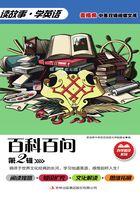
01 Why Is Louis Pasteur Important?

Louis Pasteur was one of the firstpeople to discover that diseases come from germs
come from germs .The word pasteurize that we usually see on milk containers comes from his name.
.The word pasteurize that we usually see on milk containers comes from his name.
Louis Pasteur was born in 1822 in a small village in France. As a boy, Louis was interested in art and was a very good painter. His father did not want his son to be an artist when he grew up. He wanted Louis to be a great teacher. Louis was also interested in chemistry and other sciences, so he agreed with his father and decided to go to college.
and other sciences, so he agreed with his father and decided to go to college.
After college, Louis attended a famous school in Paris that trains teachers, the École Normale Supérieure. He entered the school in 1843 to study how to teach chemistry and physics. He soon made a name for himself with his research. After he graduated, he became a professor at the University of Strasbourg. At the university, he met Marie Laurent, the daughter of the director of the university. They fell in love and married in 1849. They were very happy and had five children. Sadly, only one boy and one girl lived to be adults.
In 1854, Louis took a job at the University of Lille, a city in the north of France. He was a professor of chemistry and dean of the faculty of science—a very high position for a man of thirty-two. Around this time, the French wine industry was in terrible trouble. Their wine was sour
of the faculty of science—a very high position for a man of thirty-two. Around this time, the French wine industry was in terrible trouble. Their wine was sour and they didn't know why. The winemakers around Lille asked Pasteur to help them. After many experiments, Louis discovered that the problem came from germs. The solution was to heat the wine. This would kill the harmful
and they didn't know why. The winemakers around Lille asked Pasteur to help them. After many experiments, Louis discovered that the problem came from germs. The solution was to heat the wine. This would kill the harmful germs. The winemakers were shocked, but the method worked. Soon they also heated other drinks such as beer and milk. This made them safe to drink. The method was called pasteurization, after Louis Pasteur.
germs. The winemakers were shocked, but the method worked. Soon they also heated other drinks such as beer and milk. This made them safe to drink. The method was called pasteurization, after Louis Pasteur.
In 1857, Pasteur returned to Paris to become director of science studies at the École Normale Supérieure. At that time, there was a terrible disease called anthrax. It killed thousands of sheep and cows every year. Pasteur noticed something interesting. If an animal was sick with anthrax and got well, it never caught the disease again. He decided to inject healthy sheep with weak anthrax germs.These sheep lived and never caught the disease. Pasteur had a vaccine
healthy sheep with weak anthrax germs.These sheep lived and never caught the disease. Pasteur had a vaccine against anthrax!
against anthrax!
One day in 1885, a doctor brought a nine-year-old boy named Joseph Meister to Pasteur. A mad dog with the disease rabies bit the boy, and the doctor didn't know how to save him. In the past, Pasteur helped animals with this disease, but would his method work on humans, or would the boy die? Pasteur was very worried, but finally he tried an experiment. He injected Joseph with his vaccine and sat by his bed to watch the result. The boy lived! Immediately the news spread around the world, and Pasteur was famous.
bit the boy, and the doctor didn't know how to save him. In the past, Pasteur helped animals with this disease, but would his method work on humans, or would the boy die? Pasteur was very worried, but finally he tried an experiment. He injected Joseph with his vaccine and sat by his bed to watch the result. The boy lived! Immediately the news spread around the world, and Pasteur was famous.
Pasteur wanted to build a research institute in Paris to continue his work. People read about his methods and sent money from all over the world to help build the institute. The Pasteur Institute opened its doors in 1888. It is still one of the world's most respected centers for the study of diseases and how to fight them. Pasteur was the director of the Institute and he worked there until he died in 1895. Everyone remembered Pasteur as a great man.
Years later, during World War II, the Germans came to Paris. A German officer wanted to open Pasteur's tomb , but the old French guard said no.When the German demanded
, but the old French guard said no.When the German demanded that he open it or die,the guard killed himself. The name of the guard was Joseph Meister.
that he open it or die,the guard killed himself. The name of the guard was Joseph Meister.